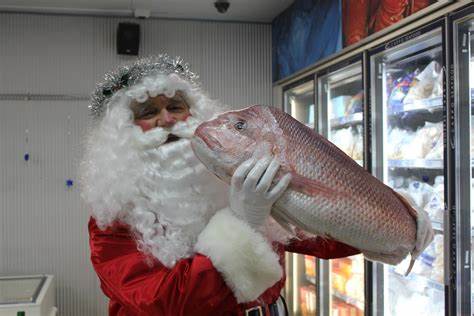Evidence has emerged just days before Christmas that Santa will be tucking into a seafood dinner on Christmas Day instead of turkey, claims the Marine Stewardship Council.
Caught on camera for the first time, the resident of Lapland in Finland will be eating the country’s traditional Christmas seafood lunch, which includes herring. This might come as a shock to many in the UK who feast on turkey on Christmas day. As Santa’s values include kindness, spreading happiness and the spirit of giving to create a better, more compassionate world, he will also make sure the seafood he eats will be sustainable.
Santa, known for his care for the world and its inhabitants, supports sustainability in all aspects, including his dietary choices. Choosing sustainable seafood means being mindful of the impact on marine life and the environment. It aligns with the spirit of preserving resources and ensuring a healthy planet for future generations—a cause that Santa champions.
In the run up to Christmas, many of us are planning festive feasts. Eating fish at Christmas has deep historical and cultural routes, particularly in Scandinavia and Italy, where it forms the centre piece of the Christmas table. But elsewhere seafood is an increasingly popular choice at Christmas, particularly for those looking for a lighter option to complement their traditional turkey or beef brisket.
Whether you’re dining out on caviar, nibbling on prawns or opting for light and healthy fish soup, it’s important, like Santa does, to choose sustainable options caught by fishers taking care of the ocean. The good news is that there are more than 100 species of seafood certified to the Marine Stewardship Council’s (MSC) global standard for sustainable fishing, meaning you can indulge yourself without contributing to overfishing.
Here are a few tips and ideas for a very merry Fishmas:
Refresh your appetite with pickled fish – like the Dutch and Swedish
In many countries in northern Europe, such as Sweden, Denmark and the Netherland, herring takes center stage at Christmas. Festive lunches include a large assortment of Smørrebrød (open-faced rye bread sandwich), and usually always feature herring.
The cured and pickled herring comes in many varieties; the cured herring can be marinated in vinegar and sugar with onions, dill, and pepper or with warm spices like nutmeg and allspice. Another popular variety is cured herring in a curry mayonnaise served with eggs. Herring should be served on dark, rye bread with a generous layer of pork fat or butter and washed down with an akvavit, a distilled spirit most commonly flavoured with caraway. It’s important to look for the blue MSC label when buying herring as some species of herring, such as Atlanto-Scando herring, are over exploited.
Ditch the turkey and go all in for seafood – like the Italians
The Feast of the Seven Fishes is an Italian-American tradition celebration in the United States. This seafood-heavy meal has its roots in Italy, where it is known as la cena della vigilia — the midnight vigil awaiting the birth of Christ.
Seafood dishes vary depending on the region: In Rome, for example, arzilla fish soup is a popular choice, while cod fritters are more commonplace in Naples. Seafood of all kinds, not just fish, is also served, including clams and calamari.
Try to beat the urge for ultra processed food and go wild for natural seafood instead
With concerns rising in 2023 over the impacts of eating ultra-processed foods why not finish off the year by swapping sausages and bacon for seafood? Wild seafood is one of the most commonly eaten natural proteins. It’s naturally organic too.
Make your prawn starter sustainable this year
Prawn salads are a favourite for many people at Christmas. MSC certified prawn fisheries go above and beyond, investing in world-leading innovations to reduce their bycatch and have catch limits based on scientific data, all of which is underpinned by responsible management practices.
Try to be healthier at Christmas with ‘super seafood’
Sustainable seafood snacks, such as salmon crackers or fish bites, will fill you up with nutrients, such as zinc, iron, vitamins A and B12 as well as omega-3 fatty acids, all essential for human health. Oily fish such as salmon and herring contain pound for pound more essential nutrients than nuts, grains, meat, leafy veg or seeds. Research has shown that, when consumed in seafood, these nutrients are better absorbed and utilized by the body than nutrients from vegetables and food supplements.
Feel good about more climate conscious choices this Christmas
Eating wild caught seafood results in less than one tenth the amount of carbon dioxide associated with red meat. Some seafood, such as mussels, also has a lower carbon footprint than cheese or chicken and turkey.
Certain seafoods, including small fish such as herring, mackerel and sprat have lower carbon emissions than rice and corn, while also being some of the most nutritious fish to eat.
Make sure your seafood comes wrapped in an eco-label
If you’re eating seafood this Christmas, be sure to check for the MSC blue tick. MSC certified seafood has to meet strict requirements for minimising environmental impact and tracking exactly where it has come from and how it was caught.
“Whether you eat seafood at Christmas regularly or want to try to add more seafood to your festive diet this year, choosing sustainable seafood will help guarantee future fish stocks for future generations.
“Look out for the MSC blue tick label when shopping for seafood this Christmas” XXX, regional programme director, Marine Stewardship Council.











